Why Immigrants Should Assimilate
Nationalism is surging in the West and it could get ugly. This will help.
Hi Everyone,
Usually Minority Report focuses on subcultures and fringe groups, but today, I want to switch gears a bit and talk about immigration in the UK, where nationalism has been rising fast. Flags are being hoisted, people are angry, and a third political party, Reform UK, is rising quickly in the polls. As an immigrant myself, twice over, it’s distressing to see the temperature continue to rise, so I’m hoping that sharing my perspective will help calm things down. Certainly, it’s not a perspective you’ve likely heard from an immigrant.
To be clear, this is about the UK not America, which is a very different animal, immigration-wise, so a lot of this stuff just doesn’t translate. Thank you as always for reading, and hopefully I’ll see you in the comments.
Sanjiv
Disassembling Assembly
It was the mid 80s. I was at Dulwich College in south London, sitting at the back of the hall for morning assembly. Nudging, sniggering, flicking little pellets at the rows in front. Every day, the same routine. A talk, followed by announcements, then the Lord’s Prayer, and then off we go to class… No running!
But this time the Headmaster paused before “Our Father…” and waited for the Muslim students to file out. All over the hall, Brown kids like me stood up and shuffled down the rows, a pair here, a cluster there, while the rest of us watched, giggling through the awkwardness. The Muslims were separating themselves.
As I remember it, the White kids just shrugged—not everyone was Christian, and anyway if you can get out of Assembly fair play to you. But I was rattled. I’d assumed the Muslim kids were the same as me, second generation Brown boys with parents from the subcontinent. The Other. By splintering off like this, they were not only injuring the cohesion of the school but abandoning me, a fellow minority. Couldn’t they see that we were in this together? That in England it was our job to fit in, not walk out? Our parents might be foreign, but not us—we were the bridge, we spanned continents, and this act of division, of separatism, was setting us all back. They were disassembling Assembly.
That was the first line crossed as I remember. And we all know the arguments that held sway—that to impose Christian prayer on non-Christians goes against religious equality and tolerance, it was a sin under Islam and anyway, the Muslim kids were also fee-paying customers who should, to some degree, be accommodated.
But there was another side to this. Dulwich College is a private school that sets its own standards and norms, many of which go back centuries—it was established in 1619, over two hundred years before the British colonized India. Its methods were successful, the school had an excellent record, and the Muslim parents knew very well that the Lord’s Prayer was part of Assembly when they chose to apply. Dulwich has been very welcoming to the children of immigrants. When my parents couldn’t afford the fees, I was offered a generous scholarship, as were many non-White students—this was long before DEI. And in the five years that I was there, I experienced no racism at all.
What would have happened if the school had simply said no, if the prevailing culture in England permitted schools to take such stands? No, you will sit through Assembly because that’s what we do here. The Lord’s Prayer is an important tradition, and if we create an exemption for you, then what’s to stop the Hindus or the Jews or anyone else? Assembly is about togetherness, equality. No one’s saying you have to believe, you can let the words wash over you, but the school must stay together for Assembly. And if you can’t do it, if your religion commands you to leave the room rather than bow your head and mumble with the rest of us, then perhaps keep walking. Perhaps this isn’t the school for you.
Instead, the school made an accommodation for fear of being called racist, and that fear would hold sway across much of the Western world for the next 40 years. Muslim demands for special consideration have been routinely accommodated. Halal food, prayer rooms, blasphemy laws, the niqab. A couple of years after the walkout came the fatwa against Salman Rushdie, for which much of the British media blamed him. The 90s saw growing radicalization followed by horrendous wars and terrorism in the 2000s, which prompted yet more capitulation. Charlie Hebdo in 2015, confirmed just how terrified the West’s media had become of both radical Islam and, ironically, the charge of Islamophobia (the consensus: “they were asking for it”). And so on it went to Sharia Councils, the prayer call, block voting and Muslim mayors up and down the country in London, Birmingham, Bradford, Oldham, Sheffield, Luton…
I’m not the only Dulwich College alum who has watched this escalate with dismay and anger. Another former student, who graduated long before me has since made it his mission to do something about it, and we are all bracing ourselves for what that might entail. His name:
The Nationalist Rabbit Hole
I’ve seen a lot of Nigel Farage lately, he’s hard to avoid, what with the recent wave of protests all over Britain regarding the migrant crisis. Crowds of ordinary citizens—or “mobs of far right thugs”, depending on your politics—have been gathering outside the hotels that house these new arrivals, whom the government calls “asylum seekers”, but the Daily Mail describes as “hordes” of “fighting age men”, from “alien cultures”.
Their complaints are as you’d expect—the cost to the taxpayer, the uptick in crime, particularly crimes against women and girls. But behind these concerns lurks the deeper anxiety that Britain is changing irrevocably and the native population is being overwhelmed by foreigners. This transcends economics, all those sound arguments that immigrants work hard, pay taxes, sustain the NHS and so on. This is about culture and national identity, and it is calling into question the entire scope of immigration. How has it worked and how has it failed? And what does changing course really mean?
As a Londoner with Indian parents who now lives in LA, I’m an immigrant squared—the son of immigrants who became an immigrant himself. My parents came to London in the 70s from West Bengal, India, and then I moved to America around 2000. So I’ve been thinking about these things for a long time. And I find I sympathize more and more with the nationalists, even though I admit, they scare me.
The algorithm knows this. It knows all of us. So as I started reading the news from England, it sent me sliding down a nationalist rabbit hole. LBC call-ins were the gateway drug, then I was fed GB News, Reform UK and—upping the dose—an Irish nationalist named Michael McCarthy who I find particularly addictive because he smiles through his anger and never raises his voice, even though his posts feel like kindling for a race war. It’s all phony asylum seekers and grooming gangs and clips of Brown and Black people behaving terribly—brawling, harassing women, littering the countryside, and turning Europe’s postcard cities into slums. And the message is always the same—Europe Has Fallen.
You can scroll your way into extremism. That’s what happened to Eric the Nazi, more or less. And there’s no doubt it gets the blood up. I too have been fretting about Europe lately. I’ll be at the grocery store in Eagle Rock full of rage about the Rotherham rape gangs. Or at the dog park in Pasadena, tossing a ball, and feeling sad about Birmingham.
It’s not unusual for British expats to look across the water, full of emotion. But these days, Americans are at it too, both right and left. The right takes the Europe Has Fallen approach, and sees it as a reason to accelerate fascism over here, while the left is looking for somewhere to flee because America Has Already Fallen. It’s a Chardonnay conversation—yes, London’s great, but what about those cheap villas in Italy, or those abandoned castles in Scotland, and didn’t so-and-so say something about Portugal…?
Then Michael McCarthy rears his head, between the castle and the villa, and I wonder whether Europe might be an even bigger powder keg.
Every immigrant must balance his various identities, racial, national, and cultural. Where we belong, where we don’t. Where our loyalties should lie. And we often have wildly different positions on these things. We don’t speak in one voice.
Over the years, I’ve barely ever seen my perspective reflected in the discourse, so I’ve opted to keep quiet. As we all know by now, it’s tricky when you deviate from received opinion about race and identity. I’ve been Woke-splained many times by liberal White women who advise me that my views are “problematic” and I should keep them to myself if I want to avoid blowback. To support assimilation, I’m told, is seen as a bit sad and Uncle Tom, a bit Stockholm syndrome: Poor colonized Brown Man, he thinks the Whites will accept him if he grovels…
Then again, these are the very people who ignored all warnings that the Woke pendulum would swing back and hit us, the immigrants of color, before anyone else. And here we are, staring down the barrel of a nationalist backlash in England and Europe that seems destined for violence. I worry about being caught in the crossfire somehow. Nationalist rage tends to be indiscriminate. After 9/11, the first victims of American reprisal were not Islamic radicals, or even Muslims at all, but Sikhs.
So I’m done biting my tongue. This is the time for plain speaking if ever there was one, and when it comes to immigration, I have “standing” to use a legal term. So if the court will allow me to share a few unfiltered thoughts that you may not have heard from an immigrant.
And if you disagree, please let me know why. I won’t be offended or get into some big argument. I’m interested in what you think. There are storm clouds ahead, and we need to be each other’s shelter. We’re all works in progress, nothing is set in stone.
A Short Case For Assimilation
Some loose definitions:
Assimilation is when immigrants attempt to adopt the host culture.
Integration is when we keep the culture of our countries of origin, but fuse with the host where possible.
Multiculturalism is when we make no attempt to join the host culture, and prefer to live separately, side by side.
It seems that multiculturalism has failed. We wouldn’t be here if it hadn’t. And wise souls like Kenan Malik saw its flaws a while back. Like marriage, if you’re not growing closer, you’re growing apart, and separation creates tribalism and conflict. Integration has led to some wonderful fusions of distinct cultures—#enriched—but it’s rare and often amounts to separation in practice. Assimilation, however, is a path to harmony. It just gets a terrible press.
For the progressive argument against assimilation, this is a pretty good breakdown. Essentially, assimilation evokes cultural erasure and a permanent hierarchy that renders immigrants second class citizens by design. Black and Brown people can ape Whiteness all they want, but they’ll never have White Privilege (and they might look ridiculous in the attempt). Also, expecting foreigners to forsake their cultures and deny “their authentic selves” is to do them harm, with echoes of colonialist supremacy etc. There’s truth to all of this.
But equally, assimilation is what being an immigrant is all about. If you don’t want to forsake your culture even a little then don’t be an immigrant. It’s a tiered existence from the start—first the visa, then the residency, then the citizenship. These are all rungs on a ladder to Englishness. My parents accepted that England was not some neutral ground where Indians and English people negotiate on equal terms. To move there is to submit to the primacy of English culture and to invite a measure of metamorphosis. It takes courage and humility and a willingness to change.
When Arnold Schwarzenegger recently said that “immigrants are guests”, it struck me as obviously true. We arrive as newcomers and are allowed in by the good graces of the host culture. And basic manners dictate that we adopt their customs, just as we bow in Japan and remove our shoes outside the temples in India. To refuse is obtuse. I was at the home of a Palestinian family in Orange County not long ago, and my friend nudged me because, the way my legs were crossed, the sole of my foot was facing the host, which is a sign of disrespect in his country. So I adjusted. I’m a guest in his house, just as he and I are guests in America.
As for the fear of erasure, I think it’s overblown. England is a remarkably tolerant and welcoming culture, far more so than Pakistan, say. Say what you like about Rishi Sunak but he was Prime Minister for a minute. And complete assimilation is never the ask anyway. It’s a little alarming and comical when people go too far and cosplay a different culture—like The Coopers in Goodness Gracious Me (in the lead image).
What I’m suggesting is not some totalitarian deletion of your former self, but rather an orientation whereby immigrants make a good faith attempt to participate in the host culture, which in turn welcomes the effort. It’s a nod of deference, a recognition that the onus is on the foreigner to adapt, not vice versa. This is how bridges are built and good will is earned. It’s a cure for prejudice and a path to peace.
Degrees of Englishness
I say I’m English because I’m more English than anything else. The immigrant identity is always fractured. England is where I was born, raised and culturally shaped. I care more about England and the English than any other country or people.
But my Englishness falls far short of a White English person whose family goes back 20 generations. Is this not obvious? Blood and soil matters. English isn’t just a language or a government stamp, it’s a people with an ongoing history in which I am a new and minor entry. My roots are shallow. I’m not saying my citizenship should be downgraded, but rather that citizenship is only a fraction of national identity. Exactly what fraction, I can’t say, but I’m sure there are areas of British life in which I should defer to those whose roots go deeper.
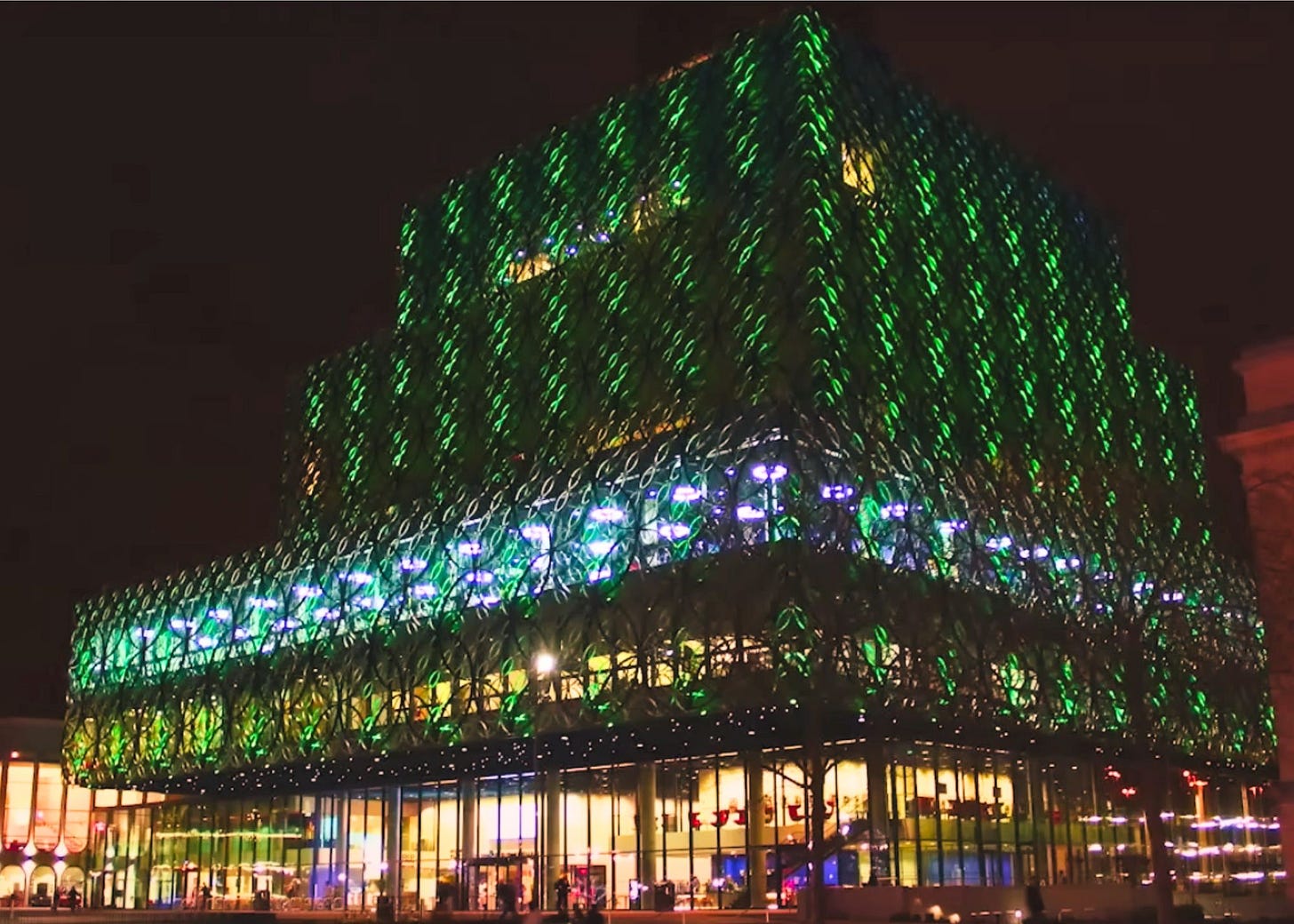
Sad About Birmingham
Not just Birmingham but Bradford, Luton, Oldham and Tower Hamlets. And the same goes for the non-Muslim enclaves like Leicester, Wembley, Tooting and Southall. It’s the clustering that saddens me, the way South Asians cleave so firmly to their culture of origin that they turn English high streets into a shabby facsimile of a subcontinental bazaar. I would love to arrive in a predominantly British Asian neighborhood and light up with pride, the way an Italian might be proud of Little Italy in New York or Boston. I don’t know that that’s ever happened. Brick Lane maybe?
So that’s one issue—the state of these places, how rundown they often feel. Another is the exclusionary foreignness.
In August 2025, Birmingham celebrated the independence of Pakistan. Flags were hoisted, buildings lit up, huge crowds in the street. And the images were a feast for GB News who asked the question: “guess which country this is. Does this look like England to you?” And of course it doesn’t. It’s all Urdu and kurtas and shalwar kameez, a sea of Brown faces—as one might expect at a specifically Pakistani celebration. But the point would stand on any other day too. Pakistani culture is too dominant in Birmingham where the White population keeps dwindling, and as this trend continues, this great English city, a seat of the Industrial Revolution, risks becoming irreversibly Pakistani, and alienating to virtually any other demographic.
I’m sad because these things may not be fixable. Ethnic enclaves form naturally, with every stripe of immigrant, and they are often poor and unpretty, a first foothold in a new country. Similarly, they feel especially foreign because these immigrants just arrived, they’re the least assimilated of all. I don’t know how to change this, but I do have a wishlist.
If only immigrants could be marbled in like chocolate swirl, rather than clumped in these pockets.
If only the immigrants of these cities were more assimilated into English culture, if the cultural needle in Birmingham pointed more toward England than Pakistan.
If only Asian-dominated enclaves were more appealing and inviting to outsiders.
A Ministry of Assimilation
Sounds Orwellian, I know. Like a re-education camp where foreigners salute a portrait of the King while Elgar plays over the Tannoy. Not what I was aiming for.
But would it be so terrible for some official body to preserve English culture through these waves of immigration? Perhaps such a body could step in to prevent enclaves from forming. Ensure that customs are respected. Perhaps its very existence would make walking out of Assembly a bigger ask.
When I became an American citizen—“naturalized”, like a health supplement—I had to pass a test and do an interview. The UK has a test too. These things tend to be fairly dry—a spot of history and government, some language proficiency, and you’re good to go. For my American interview, I boffed up on the Constitution and bit my tongue when the interviewer joked that Indians like me burned their wives alive in their back yards (true story.) But that was it—next step, citizenship. No mention of the America that I admire, a colossus of science and culture—Edison, the Blues, Dylan, Salinger, the Wright Brothers, Walt Whitman, James Baldwin and on and on. But there should have been. And the same goes for the English test.
What if new immigrants to England had to demonstrate a working knowledge of British rock n roll? Or The Life of Brian? Or George Orwell? Paul Gascoigne? Some provable attachment to the culture of this country. It’d be a fun job to determine the expansive scope and limits of Englishness—not a job for me, but for people with deeper roots.
When in Rome
A couple of years ago, I visited an ancient market in Rome like a good little tourist, but all the stalls were run by Bangladeshis. All. Not assimilated Bangladeshis, steeped in Italian culture, who had become expert in olive oil and limoncello. No, it was Ahmed, fresh off the boat, hawking his wares like it’s a market in Dhaka. Sir, come come! Try some sample!
I’m not sure anyone wants this—not the tourists, not the Italians, and I suspect even Ahmed himself would be happier working where he’s wanted. One can admire his hustle and enterprise while at the same time recognizing that something has been lost.
This is the trouble with diversity. Sometimes it can corrode or dilute a culture. True diversity flourishes only when national cultures are strong and distinct. You want England to be English and Italy to be Italian, whatever that means in each case. Instead, globalism gives us a creeping homogeneity—the same brands, the same coffee shops, the same bland gentrification aesthetic the world over, and a steady stream of Ahmeds to operate the markets in London, Rome and Paris. The truth about Ahmed is that he isn’t particularly motivated to become Italian. He just wants to send money back to Bangladesh to support his family. And honestly, I wish him the best. But Rome may be paying the price.
I told a progressive friend of mine recently that you can’t preserve European culture by populating it with the likes of Ahmed and her response was: “Wow that’s so fucking racist.” Honest question—is it?
Pick Me, I’m A Coconut
I no longer consider “coconut” an insult. To be Brown on the outside and White on the inside is simply what happens when you assimilate. And it’s a beautiful thing to decouple race from culture in that way.
But coconuts get a bad press—fellow immigrants view us as pitiable and shallow, or as self-hating sellouts who prostrate ourselves at the feet of our White masters. Another variation is “Pick me”, as in “pick me, White people, I’m one of the good ones!”
Now, I’m not saying some of those charges don’t stick. I’m not immune to self-loathing, and I can’t say my Indian roots fill me with pride. But the idea that culture should conform with race is fundamentally racist. It makes race—a social construct, by the way—the primary characteristic of our lives, which is an affront to the color-blind ideal of Martin Luther King, the ‘content of our character’. Meanwhile, the progressive left is peddling a similar essentialism, whose tools are often even blunter. That awful acronym BIPOC for instance, presumes that my skin color means have more in common with Syrian refugees, or Black people from Mississippi, than White guys from England, the very people I grew up with.
Another part of the Sellout charge is that immigrants ought to naturally side with other immigrants—as though there are only two sides here, the White hosts and the Brown/Black immigrants. So to call for a limit to immigration, or for immigrants to assimilate, is to betray “my people”. You got in, so now you want to close the door behind you and take the side of the White Man etc.
But immigrants are not some homogenous block. Syrians and Bengalis are not the same and may well be in competition. Furthermore, being an immigrant doesn’t mean I automatically support unlimited immigration. In fact, the opposite is often true. My parents came to England, in part, because Englishness appealed to them. They don’t want England to become less English. They want its culture and its appeal to be preserved.
There’s more to say—and learn—about all of this. It’s an inflammatory topic, and often difficult to discuss. But discuss we must. And I have to say, there’s something bracing about this era, for all its rage and division, because people are beginning to finally express what they truly feel, however ugly it can sometimes sound.
Speaking personally, immigration has defined me and shaped my personality. And I’m an assimilator at heart—something about being the odd one out, has meant that I’m always trying to fit in, to be accepted, this is my orientation as an individual. I’ve long felt rootless and untethered, which is not an uncommon feeling for a 2nd Generation Asian like me. But still I consider being born in London to be the single greatest stroke of fortune in my life, as my cousins in Kolkata would agree.
Let’s keep the conversation going.

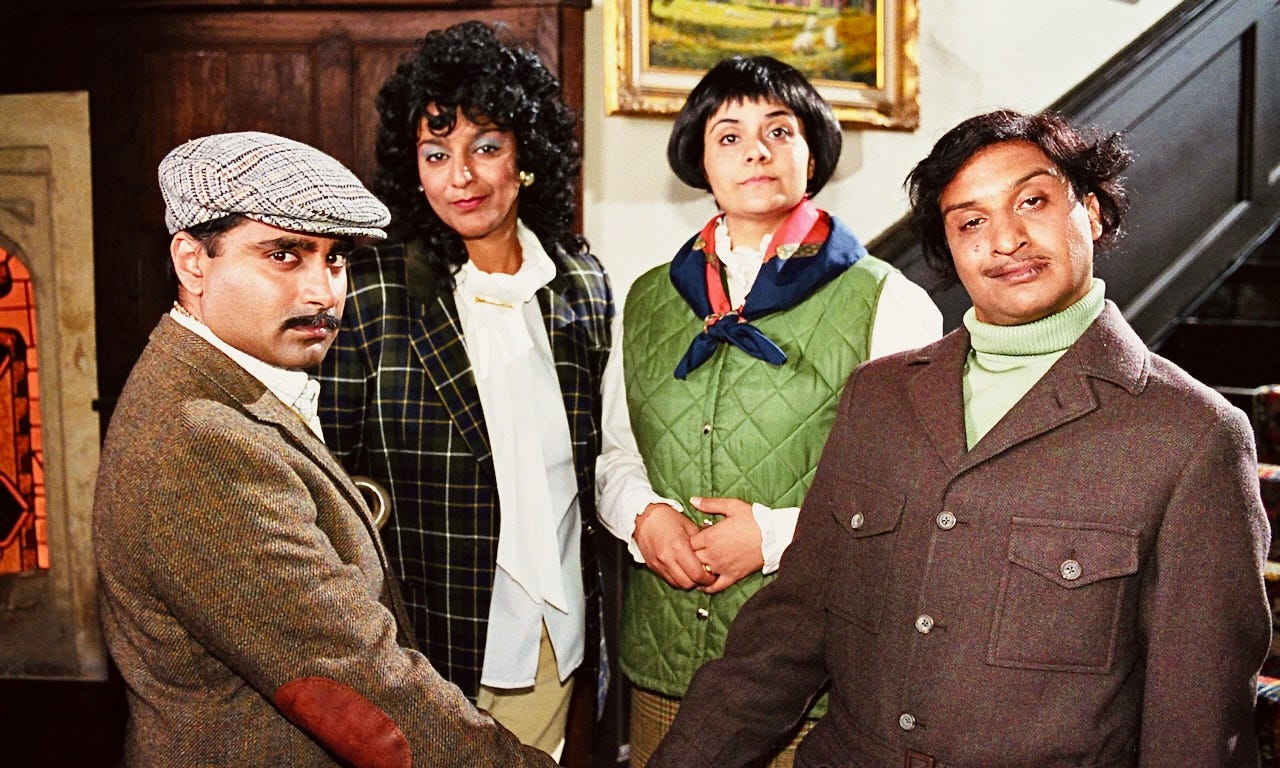
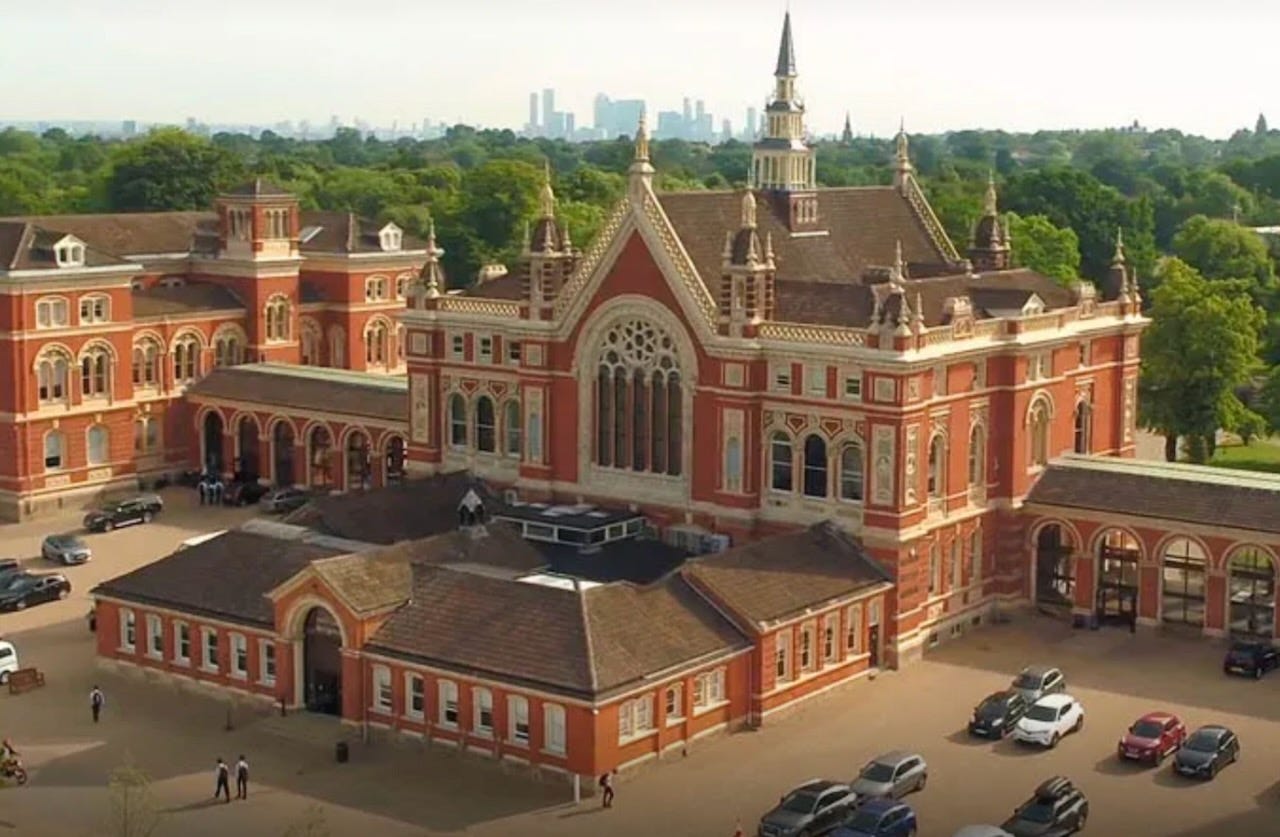
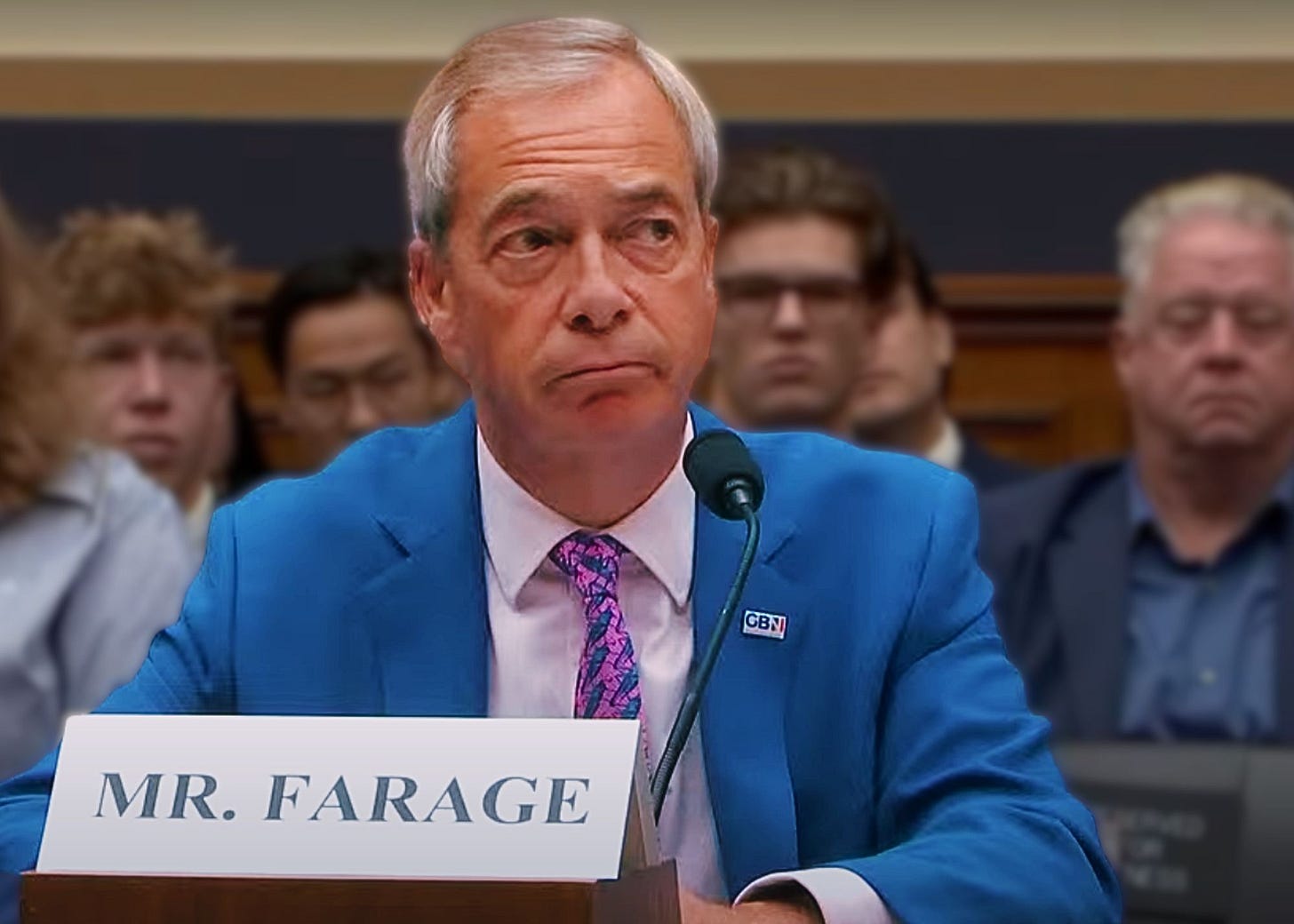


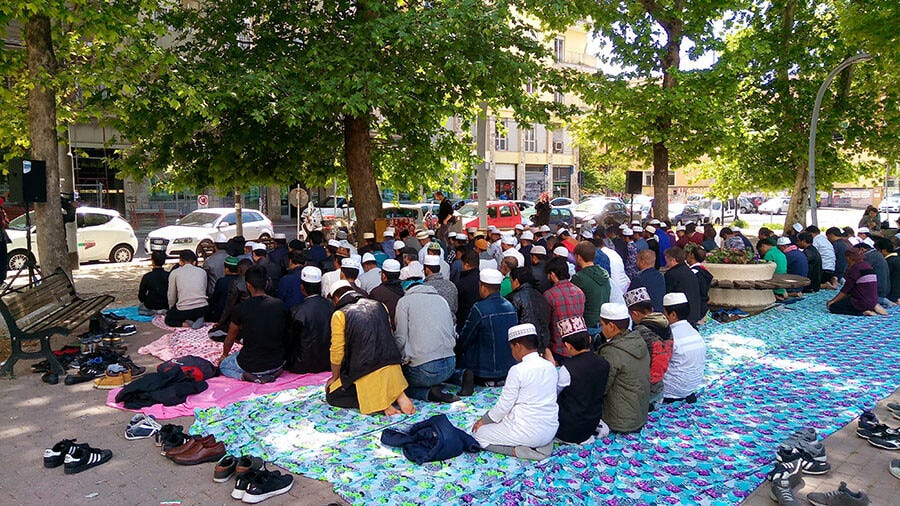
You bring nuance to a subject that some people pretend is simple. These issues are complex, and we need to have compassion for refugees, respect for immigrants, sensitivity to existing populations and cultures, and so on. That's too much for a lot of people to get their heads around, so they just pick a side. Traumatised people are arriving in the UK and being treated like cattle because our asylum/immigration system is on its knees. The government is overwhelmed and dumps them in hotels, in communities that are already under-resourced. Everyone suffers in this situation.
Thanks for a really intelligent piece - so interesting to hear your perspective.
(I'm currently working on a short post about Nigel Farage, and the dread that he might be the next Prime Minister. I don't know whether I'll publish it - as you say, it's a fraught subject and one wonders whether it's worth adding to the mayhem!)
Glad to see you back on the Stack, Sanj. This is a thought-provoking hot take. Since I'm not English (Wish I was though! All the cool people hail from there.), I'm here to learn and for moral support.